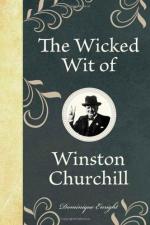|
This section contains 9,423 words (approx. 32 pages at 300 words per page) |

|
SOURCE: “Mr. Churchill as Historian,” in Historian, Vol. 20, No. 4, August 1958, pp. 387-414.
In the following essay, Lewis examines Churchill's canon of historical writings, finding that his tendency to eschew psychological investigations in favor of epic, mythologically flavored descriptions tells readers much about Churchill's own historical and cultural milieu.
It was poetic justice that persuaded the trustees of the Nobel Prize to award it to Mr. Churchill on the ground of his contribution to literature rather than to world peace. If it is a grave distortion to say that the Great Commoner is a war-monger it is at least true to say that he has always seen in war, despite its horror, the great preservative of the best virtues in both men and nations, and that the most splendid passages of his historical writings are devoted to the description of those virtues. He can perceive the victories of peace...
|
This section contains 9,423 words (approx. 32 pages at 300 words per page) |

|


